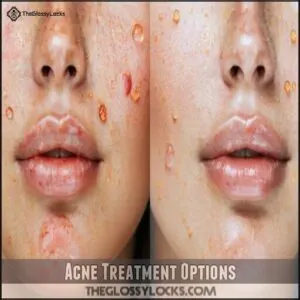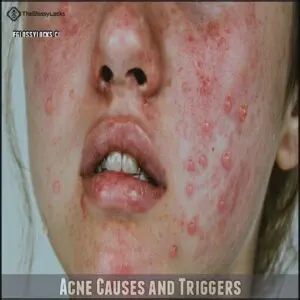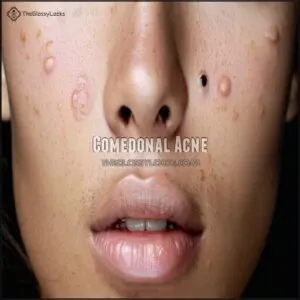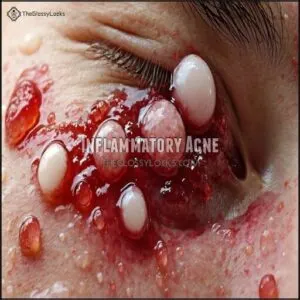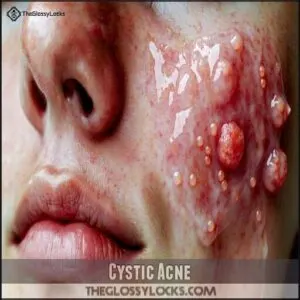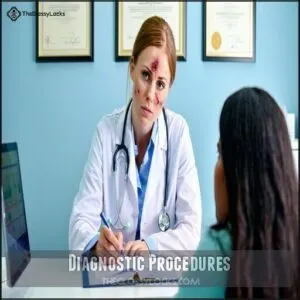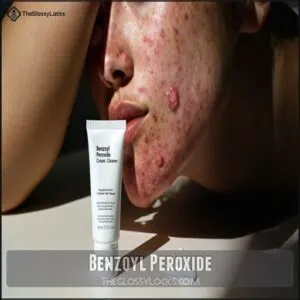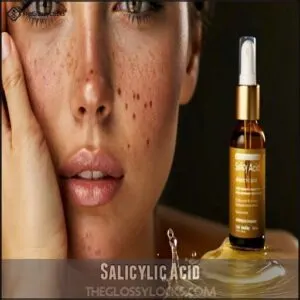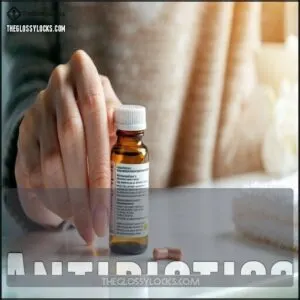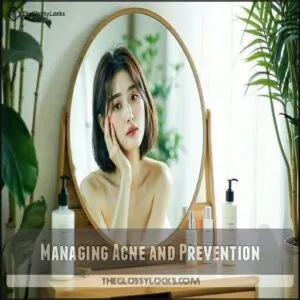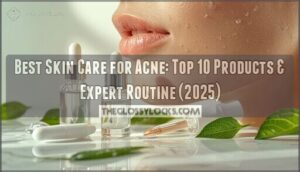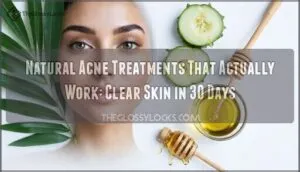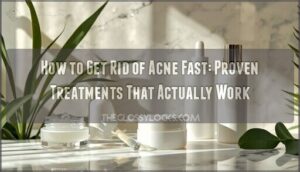This site is supported by our readers. We may earn a commission, at no cost to you, if you purchase through links.
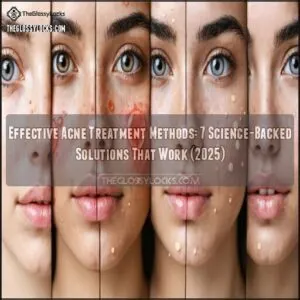
Benzoyl peroxide, salicylic acid, and antibiotics are proven options, they work by reducing inflammation, unclogging pores, and targeting bacteria.
For severe cases, prescription medications like isotretinoin and hormonal regulators can help.
Understanding your acne type, whether comedonal, inflammatory, or cystic, is key to finding the right treatment.
By exploring these methods, you’ll be on your way to clearer skin, and there’s more to discover about what works best for you.
Table Of Contents
- Key Takeaways
- Acne Treatment Options
- Acne Causes and Triggers
- Acne Types and Diagnosis
- Effective Treatment Methods
- Managing Acne and Prevention
- Frequently Asked Questions (FAQs)
- What are the different types of acne treatments?
- How do I get effective acne treatment?
- How is acne treated?
- What are the best acne treatments?
- Can acne be cured?
- How do you get rid of acne spots quickly?
- What is the most effective form of acne treatment?
- What is the best treatment to remove acne?
- What procedure is best for acne?
- What acne treatment has the highest success rate?
- Conclusion
Key Takeaways
- You’ll find that understanding your acne type is key to finding the right treatment, so it’s crucial to get a proper diagnosis from a dermatologist.
- You can effectively manage acne by using proven treatments like benzoyl peroxide, salicylic acid, and antibiotics, which work by reducing inflammation, unclogging pores, and targeting bacteria.
- You should also consider making lifestyle modifications, such as maintaining a balanced diet, staying hydrated, and managing stress, as these can help reduce acne symptoms and prevent future breakouts.
- You don’t have to live with acne – with the right combination of treatments and lifestyle changes, you can achieve clearer skin and reduce the appearance of acne, so don’t hesitate to explore different options and find what works best for you.
Acne Treatment Options
You’ll find both over-the-counter and prescription treatments that target different types of acne, from mild blackheads to severe cysts.
Your treatment options include proven medications like benzoyl peroxide and salicylic acid, along with professional solutions such as antibiotics and retinoids that work to clear your skin.
Over-the-Counter Treatments
Over-the-counter acne treatments offer a frontline defense against breakouts.
You’ll find effective solutions at your local pharmacy, from gentle face washes to powerful spot treatments. Consider exploring benzoyl peroxide cream products for effective treatment.
Here are the most effective OTC products for your skincare arsenal:
- Benzoyl peroxide creams (2.5-10%) kill acne-causing bacteria
- Salicylic acid toners unclog pores and reduce inflammation
- Niacinamide serums regulate oil production
- Oil-free skin toners balance pH levels
- Non-comedogenic acne creams prevent new breakouts to maintain healthy skin and reduce acne-causing bacteria.
Prescription Medications
When over-the-counter treatments aren’t enough, your dermatologist may prescribe stronger medications.
Oral antibiotics like doxycycline target inflammation, while topical retinoids such as tretinoin and adapalene unclog pores effectively.
For severe cases, isotretinoin provides long-lasting results.
Women might benefit from combined oral contraceptives or spironolactone to regulate hormones.
These prescription options typically show results within 8-12 weeks of consistent use.
Lifestyle Modifications
How you live directly impacts your skin’s health.
Beyond medications, significant lifestyle modifications can help manage acne effectively. Start with diet changes – reduce dairy and high-glycemic foods that trigger hormonal fluctuations.
Establish consistent sleep patterns, aim for 7-8 hours nightly.
Regular exercise helps regulate hormones and reduce stress. Stay hydrated by drinking 8 glasses of water daily, and maintain a gentle skin care routine to improve your skin’s health and overall well-being by making these lifestyle modifications.
Emerging Therapies
While lifestyle changes lay the groundwork, breakthrough technologies are revolutionizing acne treatment.
Advanced laser therapy and light treatments target deep-seated inflammation, while nanotechnology delivers medications more effectively.
Promising research in stem cells and gene editing suggests personalized solutions on the horizon.
Chemical peels, microneedling, and microdermabrasion complement traditional treatments like isotretinoin, offering hope for even severe cases.
Additionally, using acne treatment options can provide effective results for mild to moderate acne, making it a viable acne treatment option.
Acne Causes and Triggers
You’ll find multiple factors can trigger your acne, including hormonal changes and excess oil production.
Your genetics, medications, and environmental factors like stress or pollution can also increase your chances of developing breakouts, influenced by genetics.
Hormonal Fluctuations
Now that you understand treatment options, let’s explore why your hormones might be causing those breakouts.
Your body’s hormonal changes during puberty, menstrual cycles, pregnancy, and menopause can trigger hormonal acne.
These fluctuations increase oil production in your skin, leading to clogged pores and breakouts.
Birth control pills can help regulate these hormones, while specific acne prevention methods target hormone-related flare-ups.
Genetic Predisposition
While hormonal changes trigger breakouts, your DNA plays a significant role too.
Research shows that if your parents dealt with acne, you’re four times more likely to experience it.
Gene expression patterns affect how your skin produces oil and responds to bacteria, and family history studies reveal specific genetic markers linked to acne-prone skin, explaining why some people battle breakouts more frequently than others, due to their genetic markers.
Environmental Factors
Beyond your genetic makeup, your surroundings substantially affect your skin’s health.
Air pollution and high humidity levels can trap debris in your pores, while daily encounters with various environmental triggers can worsen acne.
- Wearing face masks can create a humid environment that traps bacteria
- Rough textile contact from pillowcases or clothing can irritate skin
- Occupational exposures to oils and chemicals may clog pores
- Certain cosmetic ingredients can disrupt your skin’s natural balance
Medication-Induced Acne
Certain medications can trigger unexpected acne breakouts, known as drug-induced acne or iatrogenic acne.
Several medications can cause acneiform eruptions. While these medications treat other conditions, they may disrupt your skin’s natural balance.
You can learn more about medication-induced acne.
| Medication Type | Common Examples | Acne Location | Treatment Approach |
|---|---|---|---|
| Corticosteroids | Prednisone | Face, chest | Topical anti-acne |
| Antiepileptics | Phenytoin | Upper body | Gentle cleansers |
| Antidepressants | Lithium | Back, shoulders | Benzoyl peroxide |
| Hormonal drugs | Testosterone | Chin, jawline | Alternative meds |
The treatment approach varies depending on the type of medication causing the acne, and it’s essential to find an alternative meds option that works for each individual case.
Acne Types and Diagnosis
You’ll find three main types of acne: comedonal (whiteheads and blackheads), inflammatory (red bumps and pustules), and cystic (deep, painful lesions).
Your dermatologist will examine your skin and medical history to determine your specific acne type, which helps create the most effective treatment plan for you.
Comedonal Acne
Now that you understand what triggers acne, let’s examine comedonal acne – the mildest yet most common form.
You’ll notice two main types: blackheads (open comedones) and whiteheads (closed comedones).
These small bumps form when dead skin cells and oil clog your pores, while blackheads appear dark from oxidation, whiteheads remain beneath the skin’s surface.
OTC products containing topical retinoids often help clear these stubborn spots.
Inflammatory Acne
Unlike whiteheads and blackheads, inflammatory acne appears as red, tender bumps beneath your skin.
These painful spots occur when bacteria multiply inside clogged pores, triggering inflammation and pimple formation.
You’ll notice swollen, warm areas that might feel sore to touch.
Typical treatments include oral antibiotics and prescription acne treatments to reduce redness and fight infection.
Early intervention helps prevent acne scar formation.
Understanding the role of hormonal imbalances can also help in managing and treating inflammatory acne effectively.
Cystic Acne
While inflammatory acne can be challenging, cystic acne represents the most severe form of acne.
These painful, deep-rooted lumps form when bacteria and oil become trapped beneath your skin’s surface.
You’ll notice large, tender bumps that often leave acne scars. Prescription acne treatments, including oral antibiotics and specialized medications, can help control skin inflammation and regulate sebum production.
Proper pore cleansing and early intervention are key to preventing permanent scarring.
Diagnostic Procedures
While cystic acne leaves visible marks, getting an accurate diagnosis starts with a thorough skin examination by your healthcare provider.
During your visit, they’ll document your medical history and perform a physical exam to identify your specific acne type.
- Doctors assess lesion patterns and severity during skin inspection
- They’ll ask about your family history of acne
- Physical examination reveals underlying causes
- Biopsy tests may confirm unusual cases
- Diagnostic criteria help determine treatment plans
The detailed evaluation helps create a targeted treatment approach that’s right for you, based on a thorough understanding of your medical history and specific acne type to ensure the best possible outcome with proper treatment.
Effective Treatment Methods
You’ll find proven treatments that combine over-the-counter options like benzoyl peroxide with prescription medications such as antibiotics to effectively combat acne.
Your treatment success depends on choosing the right combination of medications that target both surface bacteria and deep inflammation while considering your skin type and acne severity, which is crucial for effective treatment.
Benzoyl Peroxide
Once you’ve identified your acne type, benzoyl peroxide offers powerful skin purification benefits.
This proven acne treatment works by targeting bacteria deep within pores. You’ll find it in concentrations from 2.5% to 10% in spot treatment creams and cleansers.
Start with a lower strength to avoid irritation. For best results, apply benzoyl peroxide products consistently – they’re your skin’s reliable ally against breakouts.
When exploring acne treatment options, consider the various formulations available to determine the most effective approach for your skin.
Salicylic Acid
Salicylic acid, a powerful beta-hydroxy acid (BHA), works deep within your pores to dissolve acne-causing blockages.
You’ll find this pore-cleansing champion in 2% concentrations in over-the-counter products. It penetrates hair follicles effectively, regulating oil production and reducing inflammation.
While it’s safe for daily use, start with lower concentrations to test your skin’s tolerance. Remember to apply sunscreen, as your skin may become more sun-sensitive.
For best results, consider combining salicylic acid with hyaluronic acid benefits, which can enhance skin hydration and clarity.
Antibiotics
In the battle against stubborn acne, antibiotics serve as powerful allies for both topical and oral treatments.
When prescribed by your dermatologist, these medications target harmful bacteria while reducing inflammation.
- Oral antibiotics work best for moderate to severe breakouts
- Topical antibiotics like clindamycin fight surface bacteria effectively
- Combination therapy with benzoyl peroxide prevents antibiotic resistance
- Treatment duration typically spans 3 months
- Side effects may include digestive issues and skin sensitivity
The key to successful treatment is following the prescribed regimen and being aware of potential side effects.
Managing Acne and Prevention
You’ll learn how to manage acne and prevent future breakouts by following a consistent skin care routine.
By making a few simple changes to your daily habits, you can reduce your acne symptoms and improve your overall skin health.
Skin Care Routine
You’ll master a simple skin care routine, including facial cleansing, skin exfoliation, and moisturizing tips, to achieve clear skin solutions and reduce pimples, incorporating morning and night care into your acne skin care regimen with effective facial cleansing methods.
Understanding proper acne skin care is essential for long-term results, and it involves incorporating acne skin care into your daily routine to achieve the best outcomes with effective facial cleansing methods.
Diet and Nutrition
You manage diet and acne by focusing on nutrient balance.
- Food allergies
- Sugar impact
- Hydration effects
- Gut health
- Dairy products
can affect skin inflammation, consider a low glycemic index diet for acne prevention.
Understanding the diet and acne connection is important for effective management.
Stress Management
You can reduce stress, a key acne cause, with mindfulness techniques, relaxation methods, and breathing exercises.
Promoting emotional balance and helping with hormonal acne prevention, is an important aspect of effective acne treatment methods, using breathing exercises.
Sun Protection and Prevention
You’ll want to prioritize sunscreen use, as UV protection helps prevent skin irritation, especially on acne-prone skin.
Daily habits like gentle skin care routines can also minimize sun sensitivity and reduce oil gland activity, promoting healthier skin.
Frequently Asked Questions (FAQs)
What are the different types of acne treatments?
You’ll find various acne treatments, including topical creams, oral medications, and lifestyle modifications, to help you tackle acne and achieve clearer skin, such as benzoyl peroxide and salicylic acid.
How do I get effective acne treatment?
You’ll need a dermatologist’s guidance to determine the best treatment plan, considering your skin type, acne severity, and medical history to achieve effective results.
How is acne treated?
You’ll typically use topical treatments, like benzoyl peroxide, and oral medications, such as antibiotics, to treat acne, depending on its severity and your skin type, under a dermatologist’s guidance.
What are the best acne treatments?
You’ll discover benzoyl peroxide, salicylic acid, and adapalene are top treatments, offering effective solutions for acne, with gentle, consistent use yielding clearer skin over time, slowly.
Can acne be cured?
You can’t completely cure acne, but with the right treatments, you can effectively manage and reduce its appearance, preventing future breakouts and minimizing scarring, for clearer skin.
How do you get rid of acne spots quickly?
You’ll zap acne spots quickly with benzoyl peroxide, salicylic acid, or spot treatments, reducing inflammation and preventing scarring, so act fast, don’t pick, and use gentle products daily.
What is the most effective form of acne treatment?
You’ll find the most effective acne treatment is often a combination of topical retinoids, benzoyl peroxide, and antibiotics, customized to your skin type and acne severity, for best results.
What is the best treatment to remove acne?
You’ll likely find benzoyl peroxide or salicylic acid treatments effective in removing acne, as they kill bacteria, reduce inflammation, and unclog pores, promoting healthier skin.
What procedure is best for acne?
You’ll likely need a combination of topical treatments, oral medications, and lifestyle changes to effectively manage acne.
Consulting a dermatologist to determine the best procedure for your specific skin type and needs.
What acne treatment has the highest success rate?
Ironically, you’ll discover isotretinoin often yields the highest success rate, don’t you, with its potent ability to reduce oil production and combat severe acne effectively, in most cases, it’s prescribed.
Conclusion
Ironically, finding effective acne treatment methods can be frustrating.
You’re now equipped with science-backed solutions. By understanding your acne, you’ll find the right treatment.
Remember, effective acne treatment methods, like benzoyl peroxide, work by reducing inflammation.
You’re one step closer to clearer skin with these proven methods, so start exploring effective acne treatment methods today.
- https://www.yalemedicine.org/conditions/acne
- https://my.clevelandclinic.org/health/diseases/12233-acne
- https://health.clevelandclinic.org/home-remedies-for-acne
- https://www.niams.nih.gov/health-topics/acne/diagnosis-treatment-and-steps-to-take
- https://links.e.response.mayoclinic.org/EmailPreview-GeneralHealth

